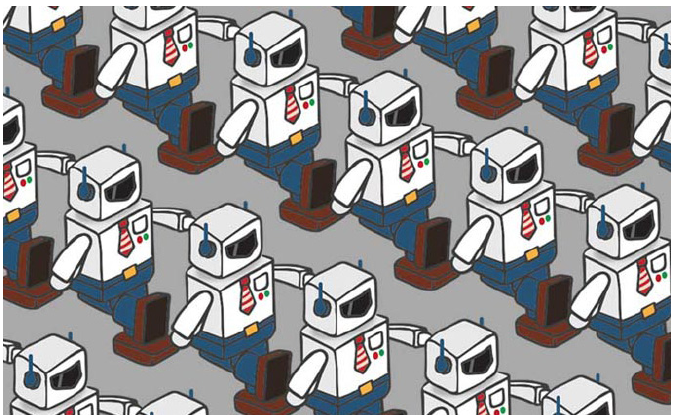
Just think about how easy it is now to check in your own baggage at the airport. Only a few years ago, we were at the whim of airline staff to do it for us. Or how about when you would plunk your groceries on the conveyor belt and watch the friendly cashier scan your cookies’ bar code? Now it’s your job, my friend. The milkman who knew your name? The travel agent? The DVD shop that boomed on Friday night? All of them - gone.
To think the march stops here would be downright absurd. It’s only the beginning. So putting our heads in the sand of the great disruption debate is not an option. We need to think around this clearly.
If you are an employer, constantly squeezed by margin pressure, looking for efficiency, what do you do? Do you invest in technology, knowing that you could render your workforce redundant? (After all, you still attend those town hall talks that say “it’s all about people ‒ not silicon chips and profit.”) Do you hold your nerve in the hope it will never happen ‒ only to have your competitor make the leap and grab the corner advantage? And for you, the employee ‒ what do you do? Join a picket and start marching?
We don’t think that any of these are smart options. Working the problem collectively is where we think the answer lies. The reality is, only some tasks are facing immediate replacement, and so it is in those spaces, where time and money find new slack, that we must seek out fresh innovative seed. Beyond the obvious but short-sighted solution of reducing staff numbers, how about thinking long-term and forging new value out of unique circumstances? Perhaps humanity doesn’t have to end up “on their knees”, as Robopocalypse author Daniel Wilson suggests. Perhaps there’s the whiff of reinvention in the air.
Finding the gap…
Don’t get us wrong. There’s good reason to perk up - maybe even panic, if that’s the fuel needed to move into new paradigm thinking. But McKinsey’s latest report on automation displacement reminds us that, although almost every occupation has partial automation potential, humans will remain an essential ingredient in the future workplace equation. Even those jobs that can be easily automated, such as nursing or teaching, rely heavily on interactions between people and expertise that stretches beyond the knowledge of facts.
Where the design and construction of cities of the future depend on public participation, the role of human creativity and ingenuity will keep rising to the top. And for machines that excel at analysing structured data, creative thinking will always remain gold, which is why future-thinking organisations are placing more emphasis on innovation and fostering creativity.